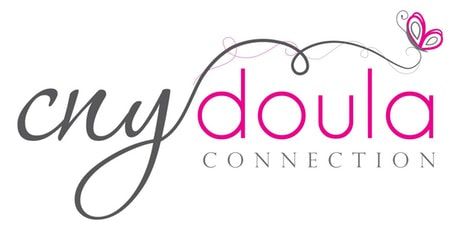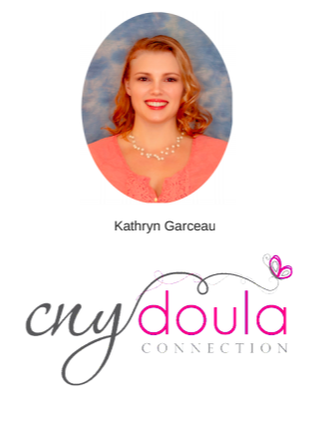|
Before you become pregnant and early in your pregnancy there are many options to consider while preparing for your birth. Here is a helpful guide to the options you may consider.
1. Location – In the CNY area you have two options for birth location…
A – Alternatives (what are the alternatives) I – Intuition (what is my gut saying is the right thing to do) N – Need time (I need some time to think about this, research this, talk to my partner and doula) Write a birth preference plan – This is to present what you would like to occur during your birth but you are not tied to this plan. Keep an open heart and mind to your birth experience knowing that rarely does what you plan for occur exactly how you envision it. Learn natural birthing techniques - All women would benefit from learning natural birthing techniques, as you will likely need to use them during some or all of your labor, even if your plan is medical management of pain. An excellent childbirth education class and a doula would teach labor coping strategies to you.
3 Comments
Number One
A doula is also a constant presence, making you feel comforted knowing we will remain by your side. Our focus is entirely on you. Most often medical providers are expected to care for multiple patients at a time, therefore usually just checking in with you periodically. A doula will join you when asked, which may be in your home or the hospital and stay with you throughout, often with only very brief breaks. Number Two Partners appreciate the guidance a doula brings to the birth. Partners take the childbirth class with you, read the books, then labor starts and...their mind goes blank. Don’t worry, that’s where the doula comes in! It’s hard to remember all of that. A doula doesn’t take the place of a partner doing things like counterpressure, but rather remind them of how and when to do them. A partner knows you better than anybody, so while partner may be face to face with mom, talking to you and caressing you, the doula may be giving you a foot massage. Doulas and partners make great teammates. Together we can do a fantastic job supporting you. Number Three Studies have shown the benefits of having a doula. These studies have concluded that having continuous labor support may decrease the likelihood of needing a cesarean, and the need for Pitocin or pain relieving drugs. Continuous support may also help you have a shorter labor and a more satisfied birth experience. (Cochrane review 2017) Number Four Besides being present at your birth, doulas also meet with you, prenatally, to offer you informational support. We help you find reputable, evidence-based information so that you can make informed decisions about your birth. We also go over comfort measures that may help ease your labor and listen to all your birth wishes. Doulas also come to your home during your postpartum period to check-in on how you are doing physically and emotionally. We can offer breastfeeding support and reflect on your birth. Doulas really are there with you throughout the whole process! So should you spend the money on a doula? While it might seem expensive, it can still be obtainable. Although doula services are not usually covered by most insurance companies, some will pay a portion or allow you to pay for a doula out of your flex spending or health savings account. Most doulas are willing to work with clients by offering payment plans. Adding doula services to your baby registry is another creative way to pay for your doula. Ask yourself these questions:
If you answered “yes” to these questions, we want you to know we are here to help! Join us May 14th to find the doula you connect with at “Doula Speed Dating.” We can’t wait to meet you! (Register here) If you are pregnant and planning to breastfeed, chances are you’re busy reading books and articles and even taking classes to learn the ins and outs of breastfeeding. You’ve read about let-down, latch, engorgement, and other lactation components, and may already have purchased a breast pump if you’re planning on using one. The truth is, however, that as important as it is to prepare and educate yourself ahead of time, once your baby is born and you are in the midst of figuring everything out, you may still be caught off guard by any number of breastfeeding obstacles. If you put baby to breast for the first time and suddenly can’t remember half of what you learned in your class, or in that book you read, you are not alone! Pregnancy is a time where you are bombarded with incredible amounts of information, and no one expects you to remember it all after giving birth. That being said, one of the most important keys to breastfeeding success is building your support team. That way, when you encounter questions and challenges, you’ll know exactly where to go to get the help you need. Lack of resources and support is a leading reason why women get discouraged and give up on their breastfeeding goals.
Here are the seven people you want in your corner to help you achieve success in breastfeeding. 1. Your partner. Whomever is going to be your primary support person at home, whether it’s a partner, spouse, relative, etc. You and your partner must be on the same page about your breastfeeding goals. It’s important for them to have information about breastfeeding, and to appreciate that breastfeeding is not always a cake walk. A partner who is unfamiliar with the process, or unaware of the many challenges that can arise while nursing, may be quick to worry that breastfeeding is not going well, and may make suggestions that go against your original breastfeeding plan. 2. Your doula. Both birth and postpartum doulas can aid in your breastfeeding success. Birth doulas not only provide you with quality, evidence-based information about breastfeeding, but the positive effects that they can have on your birth experience can also lead to better breastfeeding outcomes. Studies show that the continual support of a doula during your labor not only reduces the rates of cesareans and interventions, but also reduces the likelihood of postpartum depression, which is a contributing factor in women having breastfeeding difficulties. Women who feel supported and have positive birth experiences are more likely to have breastfeeding success. Postpartum doulas are also great to have in your support team. Coming to your home after you give birth, these doulas are also equipped with knowledge of lactation basics and can help connect you with local consultants and professionals trained in more complicated breastfeeding issues. Postpartum doulas also tackle some of the tasks on your household to-do list (laundry, vacuuming, dishes, meal prep, etc.) so you have more time to spend taking care of yourself and your baby. 3. Your baby’s pediatrician. Yes, having a pediatrician who is breastfeeding-friendly is a crucial part of your success. Some practices may even have lactation nurses on staff! If your pediatrician does not seem supportive of your choice to breastfeed, you are being told your baby is behind on the growth curve and you feel pressured to supplement with formula, you may want to get a second opinion or possibly find a new pediatrician. If you are unable to switch doctors, make sure you utilize other resources like lactation consultants to help improve your breastfeeding experience. 4. Hospital nurses and lactation staff. Those first few feeds with your newborn can get you and your baby off on the road to breastfeeding success, so make sure you make the most of your time in the hospital. You will encounter numerous lactation and labor and delivery nurses during your stay who can provide a wide variety of experience and advice. Some hospitals even have a lactation nurse that you can call up after you have taken your baby home. 5. Certified lactation consultants. Depending on where you live, you may have a number of lactation professionals in your local area. Certified Lactation Counselors (CLCs) are professionals who have undergone forty-five hours of breastfeeding management training, and passed an exam. They are also required to complete continuing education credits every three years. International Board Certified Lactation Consultants (IBCLCS) have received even more training and practical experience and their credentials are internationally recognized. You may find them working in hospitals or doctors’ offices, or they may run their own private business. Some CLCs and IBCLCs even make house calls, which can be a blessing for new parents. 6. Support groups. Lactation professionals are great for clinical help in breastfeeding, but sometimes it can be so helpful just to talk with other parents who may be having similar postpartum and breastfeeding experiences as you. Support groups and La Leche League meetings for new parents are a great way to connect with families in your area, and provide a space to be heard and receive emotional support. La Leche League is an international breastfeeding education and support network that provides resources to nursing families, as well as hosting support groups and lactation clinics in cities and towns all over the world. Visit www.llli.org to find a meeting in your area. 7. Print resources. In this day and age, a vast world of information is right at your fingertips. If you have a computer or smartphone, millions of blogs, ebooks, news articles, and forums are just a mouse click away. Libraries, childbirth educators, and doulas are also likely to have helpful breastfeeding books and materials available to borrow. Having access to books, websites, and other resources that provide information and encouragement in breastfeeding is one more tool for success. Here are a few top-rated breastfeeding resources to get you started:
If you start your breastfeeding adventure and encounter any obstacles, you’re not alone! According to a study done by UC Davis, 92% of women struggle with breastfeeding in the first few days, and many continue to encounter issues throughout the postpartum period. A major factor for women who end up supplementing with formula or who give up on breastfeeding entirely is lack of resources and support. It’s never too early or too late to start building your breastfeeding dream team, it can make all the difference in the world! -Anna Nieves-Herrera, Birth and Postpartum Doula. At our Birth Basics class on February 12, 2018, mental health professional Stephanie Straub, LMSW, led a much needed discussion on maternal mental wellness. In addition to unpacking five popular myths that new and expecting moms grapple with, Stephanie shared with us the “Pillars of Self-Care” that she teaches all of her clients.
Sleep. While this might sound like a joke to new parents, or pregnant women (especially in the third trimester), getting a reasonable amount of sleep is crucial to your physical and mental wellbeing. While sleep deprivation has been shown to contribute to Postpartum Depression (PPD), it can also negatively affect your physical health and lower your immune system. What does it look like to sleep decently in pregnancy or with a newborn? Every situation is different. It may mean investing in more pillows, or a mattress topper to make your bed more comfortable. It may mean going to bed at 7pm just to catch a few hours’ rest, if your newborn seems to habitually sleep from 7pm to 10pm every night. It may mean pumping milk or preparing bottles so that your partner, postpartum doula, etc., can take over some of the nighttime feedings. It may mean a soothing cup of tea and twenty minutes with a good book, just to unplug for the day and get your mind and body restful enough so that sleep is possible. Nutrition. As basic as it seems, you may easily find yourself forgetting to eat when you’re home with a newborn. Again, food is a crucial factor in both our physical and emotional health. In Stephanie Straub’s words, even a BigMac is better than eating nothing at all! She encourages clients to first eat something, anything, and then you can worry about what you’re eating later. Food affects our energy levels, our hormones, our moods. Skipping meals can result in vitamin and nutrient deficiency, fatigue, irritability, and a general inability of our bodies to function properly. You may think your baby’s needs are more important than your own, but in reality your baby needs a healthy and happy parent, as well as a good role model of self-care. Movement. This pillar is not at all about intense exercise. It doesn’t mean signing up for CrossFit, or going to a yoga class five times a week. Something as simple as taking yourself or your baby for a walk is enough to treat your body and mind to some much-needed self-care. Even the small act of walking has been shown to benefit cardiovascular health, combat fatigue, and improve your emotional state. Socialization. Caring for a newborn can be an incredibly isolating experience. In those early days, while your baby is brand new and your body is recovering from birth, there may be days and even weeks where you barely leave the house. As part of your self-care, it’s important to reach out to friends, family, moms’ groups, etcetera, so that the time you spend home with your baby does not start to feel suffocating and lonely. A common myth of motherhood is that your needs come second to your baby. This can leave many new parents neglecting basic necessities like food, water, and rest. The truth is, you deserve to thrive and enjoy in your postpartum period, and your baby deserves parents who are happy and healthy. Don’t feel as though you have to suffer through chronic sleep-deprivation, anxiety, poor nutrition, and isolation, as the price you pay for caring for a newborn. If you want to get a healthy start to your postpartum period, consider hiring a trained postpartum doula who can help you navigate and balance baby’s needs and your own. If you or someone you know is struggling in the pregnancy or postpartum period, Stephanie Straub, LMSW, is passionate about working with women and couples in the perinatal year. Her contact information can be found on our website (cnydoulaconnection.com), under “Friends of the CNY Doula Connection.” Please feel free to reach out to any one of our trained and dedicated doulas if you feel you may benefit from compassionate and dedicated birth and postpartum support. ~Anna Nieves-Herrera, Birth and Postpartum Doula On Monday, February 12, 2018 we welcomed Stephanie Straub, LMSW who specializes in maternal mental health. She led us through a variety of motherhood myths, including instant bonding, breastfeeding is easy, every pregnancy is planned and wanted, and a few more. However, my favorite part of the discussion was our discussion on what it means to be a good mother. This discussion had a variety of perspectives, from doulas, new moms, soon to be moms, and other support persons. Each person who shared their concept of what being a good mom is differed in their responses; however, a common theme emerged.
As a Women and Gender Studies degree holder, this theme intrigued me. The responses revolved around the traditional expectations of being a good wife/partner. Participants shared thoughts, such as cleaning the house, preparing meals, doing the laundry and dishes, and making sure their partners got enough sleep for work in the morning. Most of the participants felt a pressure to be “super mom.” It stood out to me that traditional gender roles still persist in our society, and we forget the importance of self care as a new mom. However, Stephanie was able to help bust this myth by focusing on the accomplishments of the day, as opposed to the things that you didn’t get to. Instead of being upset about the laundry that didn’t get done, focus on how you fed your baby, changed your baby, held your baby, soothed your baby. That’s a lot of work, and you should feel a sense of accomplishment for everything you did. She also discussed the four pillars of self care: sleep, nutrition, movement, and medical care. As a new mom, it can be hard to remember to take care of yourself. Self care is essential; you can’t continue to care for someone else if you aren’t taking care of yourself. We were so glad to discuss such an important topic that gets overlooked, and Stephanie did a wonderful job at keeping it an upbeat and lively conversation. If anyone is seeking extra support throughout their postpartum period, or even during pregnancy, consider hiring a doula or reaching out to Stephanie. Her contact information can be found on the Friends of the CNY Doula Connection page on our website. ~Erin Sawyer, Birth and Postpartum Doula |
Details
CNY DoulasThe CNY Doula Connection's doulas write all about birth! Archives
June 2022
Categories |




 RSS Feed
RSS Feed